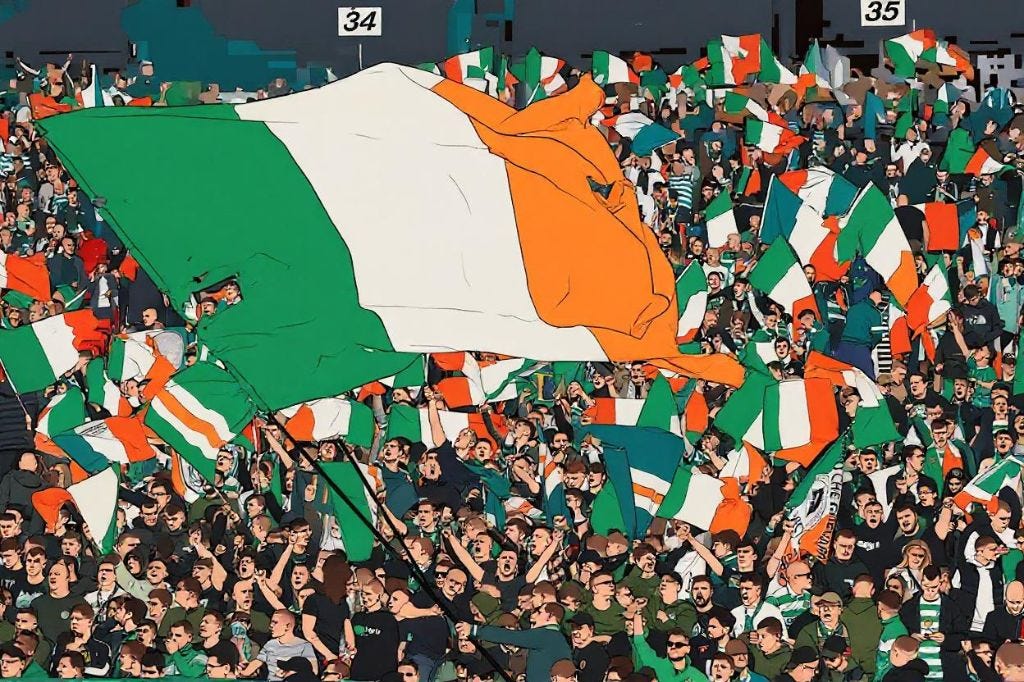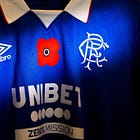Empire’s Shadows: Why Celtic Fans Say No to the Sham of “Remembrance”
As the media and politicos remain silent on Rangers profiting from military and remembrance symbolism - fuelled by sectarianism - Celtic fans are denounced for refusing to stay silent.
Every Remembrance Weekend, the usual suspects vent their outrage. The British media, the Unionist politico class, and the Rangers support - often echoing the language of far-right intimidation - pronounce judgment on Celtic fans who refuse to observe a minutes silence in tribute to a military tradition that, for many, feels more like an Imperial decree than an act of remembrance. This annual ritual of shaming Celtic supporters is not about honouring the dead; it is about policing national identity, defending a state narrative, and smearing dissent as immoral and un-British treachery.
The poppy’s meaning has changed for good in the past few decades. It began as a humble reminder of the fallen during the First World War and thereafter the Second World War, but it has since been commandeered by politicians and far right reactionaries who use it as a shield for state violence and a weapon against those who criticise and condemn Britain, British foreign policy, and their war crimes. Today, the poppy is leveraged to virtue-signal loyalty to a military tradition that has long outgrown its original purpose, and it is wielded by those who pretend they speak for all veterans even as they turn a blind eye to the real, lived experiences of many who carry the scars of war and its modern legacies.
Within this sanctified surface, the poppy has become a target for confrontation. Many have openly tried to police what counts as a rightful homage, targeting individuals who dissent or refuse to follow the narrative, including figures like James McLean. Erupting in organised, online, and on-pitch outrage when McLean, Celtic fans, and fans of other clubs choose a different path from the official script. This is not a spontaneous outcry about remembrance; it is a calculated pressure campaign designed to stigmatise nonconformity and to redefine dissent as treasonous disrespect for Britain and its armed forces.
Celtic’s roots run deep in Ireland, and that matters. A significant portion of Celtic fans trace their ancestry back to families who fled the Great Famine in the 19th century, escaping a genocidal system that, in its actions and inaction, betrayed and helped murder the most vulnerable. The narrative of exile and displacement is woven into the club’s identity. For many fans, Remembrance Weekend is not a simple show of national solidarity; it is a reflection on a history of British power that has committed crimes against the vulnerable in Ireland and elsewhere. The Troubles - where the British Army was regularly implicated in the death of hundreds of Catholics and found to have colluded with Loyalist paramilitaries - are part of a painful continuum that cannot be erased by a televised minute of silence. It is a reminder that the cost of empire is paid in innocent lives, the trauma of communities, and the enduring memory of those who continue to demand accountability.
Recent history compounds the case. In the aftermath of Bloody Sunday, soldiers responsible for the killing of 13 innocent civil rights protestors remain protected by the mechanisms of the state. The absence of justice for Soldier F aka Lance Corporal David James Clear illustrates a justice system that has often prioritised stability and narrative over accountability. The violence of that day against a peaceful civil rights march, and the broader wars in Iraq and Afghanistan, raises profound questions about the legitimacy of a military culture that is celebrated as an unambiguous force for good while its operations abroad leave behind a trail of bereaved families, shattered communities, and the dead bodies of their victims. For many fans, this complicates any simple act of homage, particularly when the state’s own record on veterans’ welfare - mental health, homelessness, ongoing neglect - speaks to a failure to honour those who served and lived.
The poppy is not a neutral emblem of remembrance; it is a banner under which the state claims moral superiority while denying the victims of its policies at home and abroad. The blanket justification that the poppy represents “all wars” ignores the selective memory at the core of this symbol. It becomes a form of state-approved memory that excludes those who oppose or criticise imperial violence, and it suppresses voices that remind us of the human cost of those wars. Just as they are currently doing to Palestine Action and anti-Zionist protestors who condemn the British Government’s complicity in the genocide in Gaza.
If the objective is truly to honour veterans, the conversation must shift away from symbol policing and toward a humane, evidence-based commitment to the people who have served. Veterans deserve robust mental health support, housing, and a society that acknowledges the reality of their experiences. Too often, governments have talked about sacrifice while letting veterans fall through the cracks once the flag-raising ceremonies fade and the bugles go silent from the headlines. The broader question, then, is not whether fans boo or remain silent for a minute; it is how a state treats those who have carried its burdens long after the guns fall silent.
There is also a striking hypocrisy in the way that Rangers fans address Celtic supporters’ stance on Remembrance Weekend. The club itself has trotted out the symbolic trappings of national service - Royal Marines re-enactments, artillery displays, and a visible military presence on match days - while having a commercial strategy that profits from Poppy merchandise. If the same critics who denounce Celtic’s silence on the minute’s silence truly believed in the sanctity of remembrance, they would demand accountability for the Rangers hierarchy profiteering from Poppy adorned Rangers tops, including the pathetic 10% of all sales going to charity versus how much is absorbed by corporate partners and the club’s coffers. Instead, there is quiet tolerance, or outright complicity, from sections of the media and political class that have little to say about the ethics of profiteering from Remembrance.
The mainstream press in Scotland has a history of presenting Remembrance Weekend as a uniform national ritual that everyone must adhere to, ignoring the diverse, often painful, perspectives that exist within the Celtic-supporting community and Irish Catholic community across Scotland as a whole. Persistence in reporting a monolithic view - where silence is the only righteous posture - acts as a tool of social discipline. It suppresses legitimate criticism of war, empire, the state’s role in perpetuating conflict, and the crimes committed on their behalf. The media should be a forum for debate, not a megaphone for a hollow ritual that excludes those who demand a more honest reckoning with history.
If there is a genuine commitment to honouring veterans, it is imperative to widen the scope of remembrance. A broader approach would recognise not only the sacrifice of those who served in distant campaigns but also the sacrifices made by families and communities affected by those wars - whether in Ireland, the North of Ireland, or elsewhere. It would acknowledge the trauma faced by veterans grappling with mental health challenges and the real-world consequences of violence. And it would demand accountability for policies that have resulted in harm, murder, and war crimes, both domestically and internationally.
Remembrance should be about truth-telling as much as about memory. The state has a responsibility to confront its past and to ensure that those who served are treated with dignity, given real support, and not used as props in a political theatre. Remembering should compel us toward justice, not toward blind patriotism or the hollow defence of a military institution that has often acted with impunity to commit murder, war crimes, and genocide.
Lest we forget.





The hypocricy of the organisation regarding where the money goes is disgusting.
There are 100s if not 1000s of veterans on the streets whilst i heard recently that they have c. £180m in the bank.
WTF are they hoarding that for?